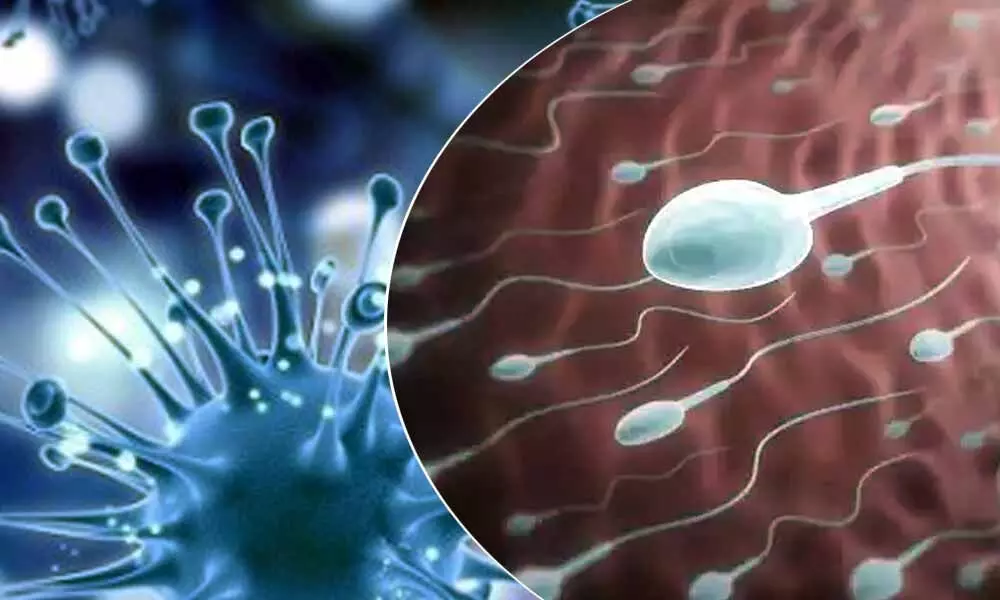Live
- Telangana's Traditions Will Be Protected, Village by Village : BRS Leader MLC K. Kavitha
- Uganda to relocate 5,000 households from landslide-prone areas in eastern region
- Harish Rao Criticizes CM Revanth Reddy: "His Time is Over"
- Vijay Sethupathi Hails 'Vidudala-2' as a Theatrical Game-Changer
- Sahaj Yog: A Path to Inner Transformation and Harmony City takes giant strides
- Allu Arjun meets his uncle Nagababu at his residence
- J&K L-G felicitates Langar organisations & NGOs for contribution during Amarnath Yatra
- Hit by Covid, MP's Rakesh Mishra sees revival of his fortunes, courtesy PM SVANidhi scheme
- Trailblazing Yakshagana Artiste Leelavathi Baipaditthaya No More
- Cong in direct fight with BJP on 45-50 seats in Delhi Assembly election: Sandeep Dikshit
Just In
Covid-19 Causes Male Infertility Harming Testicular Cells: Study Claims


An Israel Study Claims That Covid-19 Pandemic Causes Male Infertility Harming Testicular Cells
The novel disease Coronavirus which is rapidly spreading in the world… It is making the people stay at homes and avoid gatherings due to the contagious symptoms.
The novel disease Coronavirus which is rapidly spreading in the world… It is making the people stay at homes and avoid gatherings due to the contagious symptoms. But according to a recent study, this pandemic is also causing male infertility by harming the testicular cells which produce sperms. The sperm count of infected men will get halved in the 30 days after getting diagnosed with Covid-19. Scientists also want to know whether Covid-19 permanently damages the fertility and it is a temporary issue.
This study was conducted by researchers in Israel. This research is published in the journal of Fertility and Sterility They also claimed to sperm motility or its ability to move by itself. Even the doctors insist the reports of men who are having lower sperm count are likely to down them having a fever making it the symptom tale of covid-19. Even the scientists say that, the novel virus makes it harder to produce the sperms. There is even a chance of bouncing back of production after the infected person completely gets recovered.
Even the professor Allan Pacey who is an andrologist at the University of Sheffield and former chair of the British Fertility Society doled out that, he wouldn't get surprised if this virus causes a temporary down in sperm production.
He said, "People who get coronavirus are probably quite unwell, even influenza will cause a decline in sperm count temporarily. The question is whether it is permanent and whether it is recoverable."
Although the research is still going on, it may take a long time to conclude the damage caused by this pandemic. It is still not known whether the drop in sperm count is a long-term issue or not.
But Professor Pacey has cautioned against the research of Israel and its finding. This examination was conducted on 12 men who died of the virus but The Jerusalem Post didn't want to expand on this observation as they wanted a greater clarity.
He also doled out that, deceased patients would have been much sicker than the average infected persons or there may be an age gap between them. Even these factors also decide the drop in sperm count.
He said, "There's a bit of caution there because if you're in ICU and you die you're very sick, so we shouldn't be surprised if there are changes in the testicles. Also, men who get very sick and are in ICU tend to be older."
He added, "I think that's very difficult to prove and I'd like to read the paper. We've done work on other viruses, for example, chlamydia, bacteria that behaves like a virus, and it's really difficult to prove if the virus is inside the sperm."
Even there is research going on the transmission of the virus via semen or vaginal fluids. Although there is no evidence, the research is still in progress. But the virus named 'SARS-CoV-2' will get passed from one person to other through a kiss during the sex.
Dr Dan Aderka who works at Sheba Medical Center carried out the study and doled out, Covid-19 could harm the testicles by getting bound to the ACE2 receptors. Thus, the receptors which act as the gateway for the entrance of the virus will have the same effect on lungs, heart and intestines.
Finally, Professor Ian Jones who works as the virologist at the University of Reading, doled out that Covid-19 generally doesn't travel in the blood.
He also said, "The main site of virus replication in the respiratory tract but it is not generally what coronaviruses do. I may be wrong, this is a new virus, we're learning all the time."

© 2024 Hyderabad Media House Limited/The Hans India. All rights reserved. Powered by hocalwire.com






